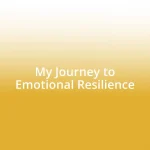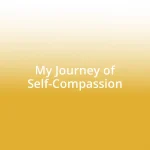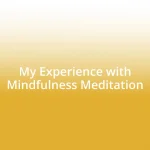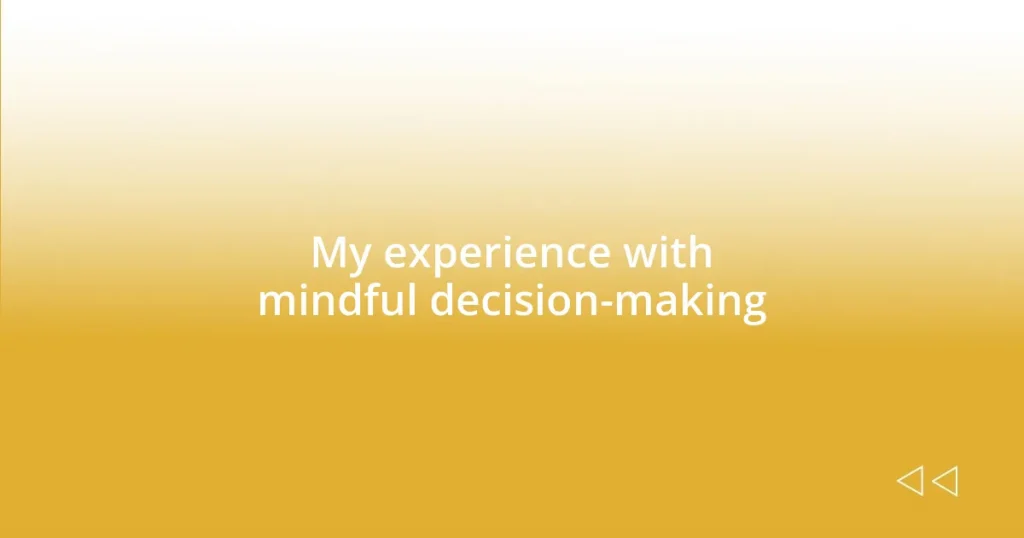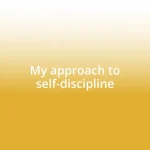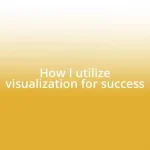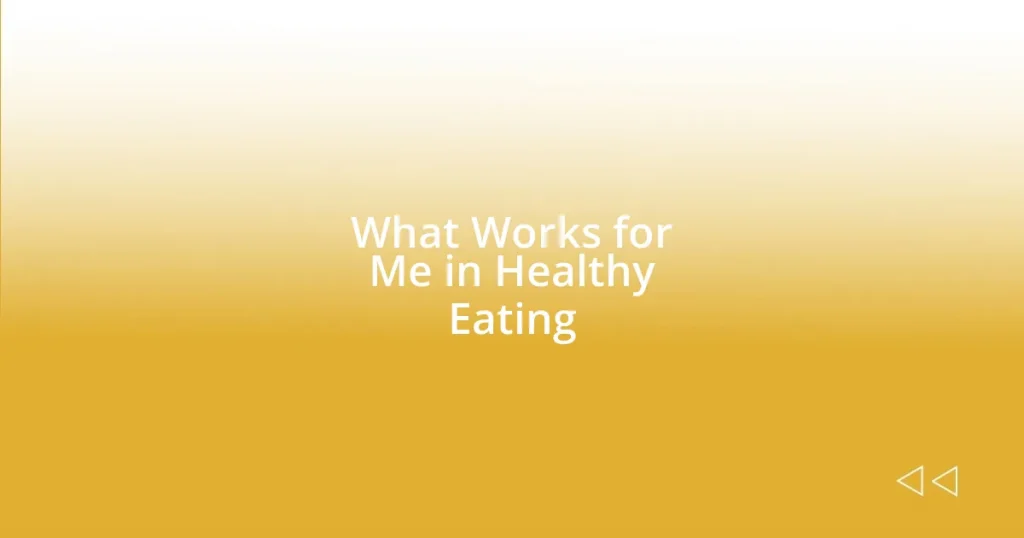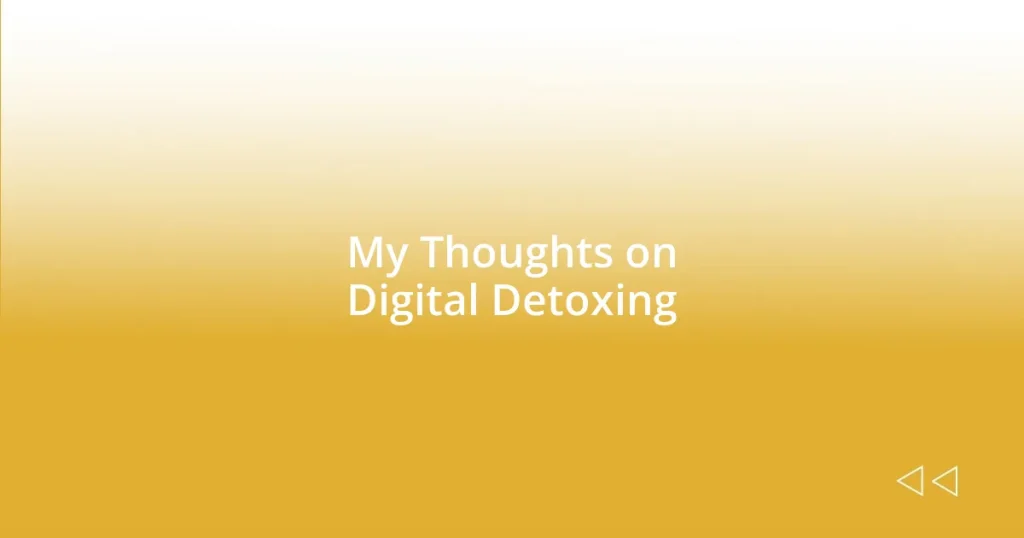Key takeaways:
- Mindful decision-making involves slowing down, reflecting on core values, and reducing anxiety during choice-making.
- Practices such as journaling, visualization, and mindful breathing enhance focus, self-awareness, and emotional well-being.
- Challenges include overthinking, societal pressures, and distractions, which can impede clarity when making decisions.
- Lessons learned emphasize the importance of pausing, trusting intuition, and sharing experiences with others for support and insight.

Understanding mindful decision-making
Mindful decision-making is about bringing awareness to the choices we face, often in moments that can feel overwhelming. I remember a particularly stressful time in my life when I had to decide whether to accept a job offer or stay in a role that was comfortable but stagnant. By taking a moment to breathe and truly reflect on what each option meant for my personal growth, I found clarity that would have otherwise eluded me.
At its core, this practice invites us to slow down and surrender to the present. I often ask myself, “What do I truly value, and how does this decision align with that?” This inquiry not only grounds my choices but also diminishes the anxiety of making hasty decisions. It’s fascinating how a few intentional breaths can shift our perspective, allowing us to see the bigger picture without the fog of stress clouding our judgment.
As I ventured deeper into mindful decision-making, I found its impact reverberating throughout my life. Rather than rushing into choices, I learned to embrace uncertainty and trust my instincts. Can you recall a moment when you felt torn between options? Reflecting on that can unearth insights, reminding us that often, the best decisions come from a place of calm and clarity rather than chaos.

Benefits of mindful decision-making
Mindful decision-making has a profound effect on emotional well-being. When I adopted this approach, I noticed a significant decrease in my stress levels. There was a time when I faced a dilemma about whether to relocate for a potential promotion. Instead of jumping at the opportunity, I chose to meditate on it. This moment of stillness allowed me to consider not just the career benefits, but also how the move would impact my relationships and lifestyle. Ultimately, I felt more connected to my choices, leading to greater satisfaction with the outcome.
Another remarkable benefit is the enhancement of focus and clarity. By practicing mindfulness, I’ve cultivated the ability to break down complex decisions into manageable parts. For instance, when deciding to invest in further education, I laid out my motivations, aspirations, and potential setbacks. This systematic approach, made possible through mindfulness, transformed what initially felt overwhelming into a structured plan. The clarity I gained was empowering, motivating me to take decisive steps toward my goals.
Lastly, mindful decision-making fosters a greater sense of self-awareness. As I sift through options, I often ask myself, “What resonates with my core values?” This ongoing dialogue helps me align my decisions with my true self. I recall a moment when I had to choose between a lucrative business opportunity and a passion project. By reflecting mindfully, I realized that personal fulfillment outweighed monetary gain for me. This process has not only boosted my confidence but has also aligned my actions with my authentic self.
| Benefits | Insights |
|---|---|
| Emotional Well-being | Reduced stress and higher satisfaction through reflective decision-making. |
| Focus and Clarity | Breaks down complex decisions, making them manageable and empowering. |
| Self-awareness | Aligns decisions with core values, leading to greater authenticity and confidence. |

Techniques for mindful decision-making
When it comes to mindful decision-making, I’ve found that taking intentional pauses can be transformative. One technique I often employ is the “4-7-8 Breathing Method,” where I inhale for four seconds, hold my breath for seven, and exhale for eight. This simple practice not only calms my racing thoughts but also creates a mental space where I can weigh my options more clearly. By creating that gap, I can catch myself before rushing into decisions I might later regret.
Here are some effective techniques I’ve learned for mindful decision-making:
- Journaling: Writing out my thoughts helps me articulate my feelings and analyze my choices more deeply.
- Visualization: I imagine my life if I take each option, allowing me to see long-term impacts clearly.
- Mindful walking: During a walk, I focus on nature and my breath, which often leads to unexpected insights about my choices.
- Pros and Cons List: While simple, this method helps me organize my thoughts visually, clarifying what really matters to me.
- Consulting trusted friends: Discussing options with someone I trust brings new perspectives and helps me feel less isolated in my decision-making.
These techniques have not only deepened my understanding of my own needs but have also helped me cultivate patience in a world that often pushes us to make rapid choices. Reflecting on these moments, I’ve embraced the fact that decision-making is an art, one that requires both heart and head.

My personal decision-making process
In my personal decision-making process, I’ve learned to slow down and really listen to my internal dialogue. There was a time when I was torn between accepting a job offer that sounded great on paper and maintaining my current job, which I loved. I remember sitting quietly, journaling my thoughts late at night. As I wrote, I felt my heart racing with excitement and dread at the same time. This helped me realize that the fear of leaving a safe haven was stronger than the allure of the new role. The clarity I gained was both liberating and grounding.
Sometimes, I find myself asking, “What does my gut say?” After a significant life decision, like choosing a university program, I often reflect on my feelings during that decision. I can vividly recall the flutter of excitement coupled with anxiety as I weighed my options. It was through this emotional awareness that I decided to trust my instinct over external pressures. Rather than strictly focusing on prestige or salary, I chose a path aligned with my passion for learning. This alignment brought me peace, transforming what could have been a stressful time into an opportunity for growth.
Each experience deepens my understanding of my values. Recently, when considering whether to volunteer more of my time, I found myself confronted with the question, “Am I truly ready to give this time, and what will it mean for my well-being?” I realized that wanting to help others must also come from a place of self-care. After some thoughtful reflection, I decided to commit to a cause that resonated with me personally, striking a balance that felt genuinely rewarding. This discovery process doesn’t just inform my choices; it shapes a deeper, more connected version of myself, leading to a more meaningful and enriched life.

Challenges in mindful decision-making
Mindful decision-making can be surprisingly challenging, especially when emotions run high. I remember a time when I was considering relocating for a job. On one hand, the opportunity was enticing; on the other, my connection to friends and family weighed heavily on my heart. It felt like a tug-of-war between excitement and fear, making it tough to balance emotion and rational thinking. It’s in these moments that I often ask myself, “Am I making this choice from a place of integrity or mere impulse?”
Another hurdle I’ve faced is the pressure of societal expectations. There was a period when I felt compelled to follow a typical career path that society deemed successful. I had to pause and reflect, asking, “Is this truly what I want?” This self-inquiry was pivotal. It demanded vulnerability, as I challenged deeply ingrained beliefs about success, which initially caused a bit of unrest within me. Yet, this discomfort opened the door to a more authentic way of living and decision-making.
Finally, let’s talk about distractions. One challenge in staying mindful is the constant noise around us. There have been countless evenings when I’ve grabbed my phone the moment I faced a tough decision, scrolling mindlessly through social media out of habit. This diversion fogs my mind, making it even harder to connect with my true feelings. I’ve learned that creating a dedicated space—either through specific times for quiet reflection or setting tech-free zones—helps me confront decisions with clarity. Have you found similar distractions in your life? It’s a common struggle, but recognizing and addressing it can truly enhance our decision-making practices.
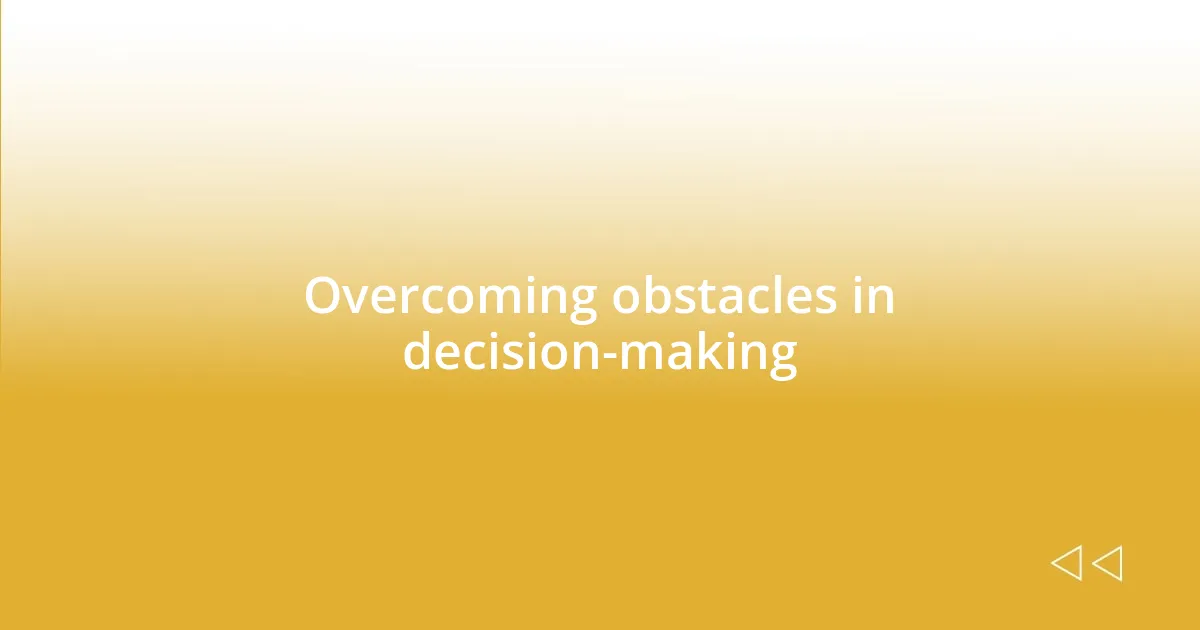
Overcoming obstacles in decision-making
One of the biggest obstacles I’ve encountered in decision-making is the paralysis of overthinking. There have been times when I over-analyzed even the simplest choices, like what to wear for an important meeting. While I grumbled about it, I realized that overthinking just added unnecessary stress. I found myself questioning, “What if they judge my outfit?” Then, I consciously reframed my thoughts and focused on the content of my presentation instead of my appearance. It felt freeing to let go of that superficial concern.
Confronting fear is another barrier I’ve had to face. I still remember the anxiety I felt when deciding to confront a friend about a lingering issue in our relationship. The thought of rejection loomed large in my mind. But I reflected on my long-standing values of honesty and respect. I asked myself, “Is keeping quiet serving either of us?” Ultimately, that moment of vulnerability strengthened our friendship and enriched my understanding of open communication.
Learning to practice self-compassion has been essential as well. I often catch myself being overly critical of my decisions. For instance, when I chose not to pursue a promotion I wasn’t passionate about, I initially felt regret. I wondered if I was a failure for not wanting more. However, taking the time to acknowledge my feelings and reminding myself that it’s okay to choose joy over ambition allowed me to embrace my choice. Isn’t it crucial that we actively honor our genuine wants and needs in our decision-making? It’s a lesson I carry with me, guiding my path forward.
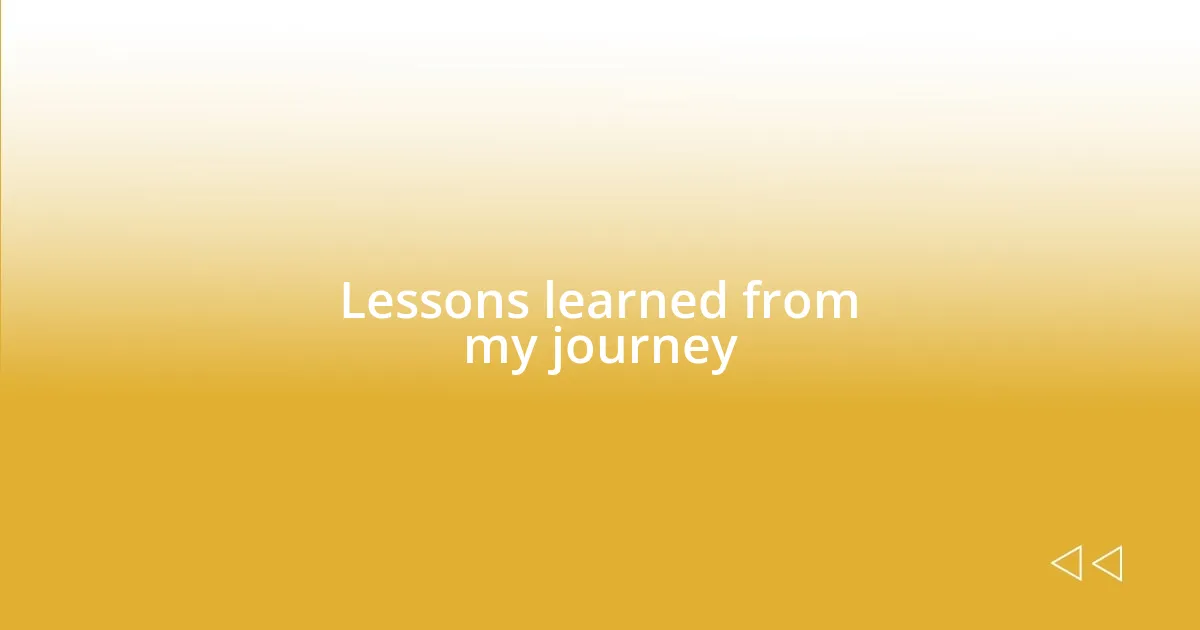
Lessons learned from my journey
Throughout my journey with mindful decision-making, one significant lesson I embraced is the power of pause. I recall a moment when I was rushing to choose a vacation destination, swayed by friends’ excitement. Instead of succumbing to their enthusiasm, I took a deep breath and reflected on what I truly desired from this trip. This simple act of pausing transformed the experience, allowing me to choose a place that resonated with my soul. Have you ever felt the weight of a quick decision lifting once you give yourself a moment to think?
Another pivotal lesson for me was acknowledging the role of intuition. I remember standing at a crossroads with a career decision, weighing pros and cons meticulously. Yet, deep down, there was a faint voice nudging me toward a different path, one less conventional. I learned to trust that inner guidance, realizing that mindful decision-making isn’t solely about logic; it’s also about listening to what feels right. When was the last time you tuned into your gut feelings while deciding?
Furthermore, I’ve discovered the importance of sharing my decision-making experiences with others. I used to keep my struggles bottled up, thinking I had to have it all together. But when I opened up to a mentor about my doubts, I found clarity and support in the shared wisdom of others. Engaging in these conversations showed me we’re often not alone in our struggles, and collective insight is invaluable. How has collaboration enriched your own decision-making process? Each lesson I’ve learned encourages me to stay curious and open as I navigate future choices.





